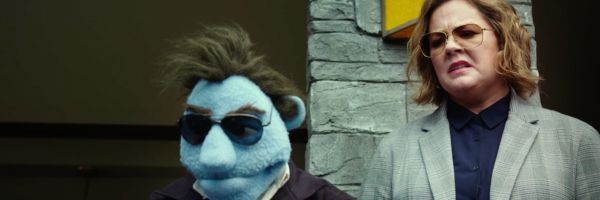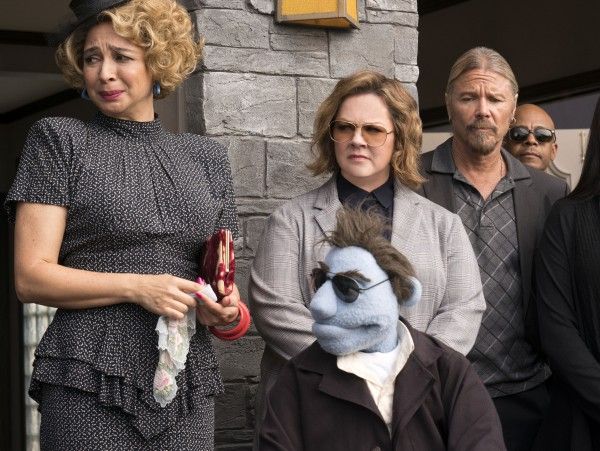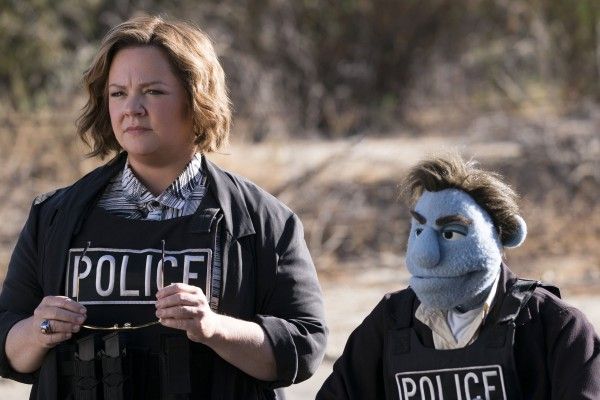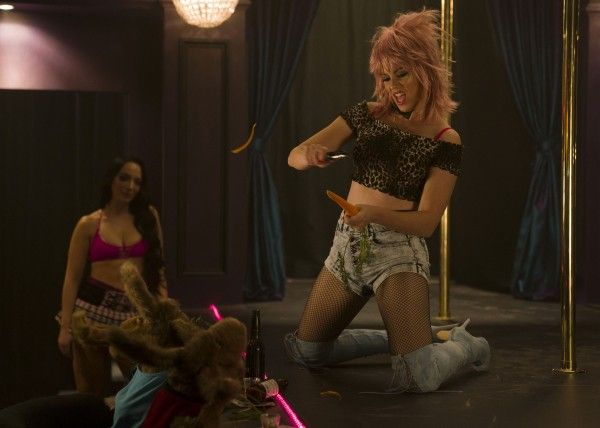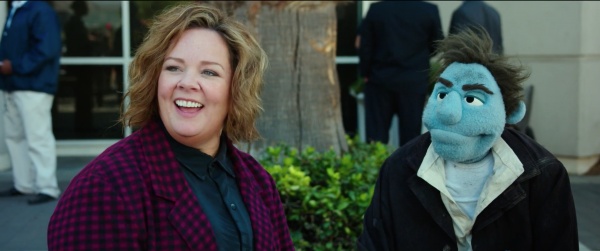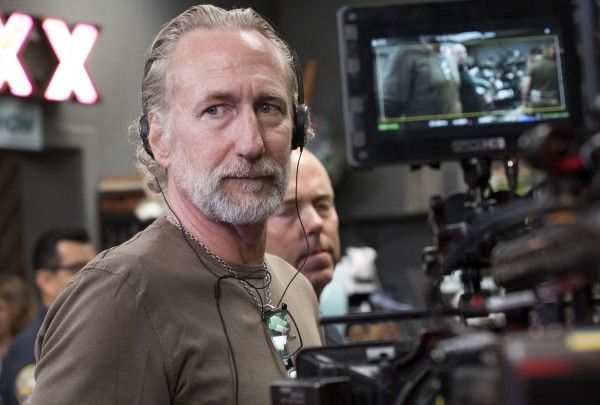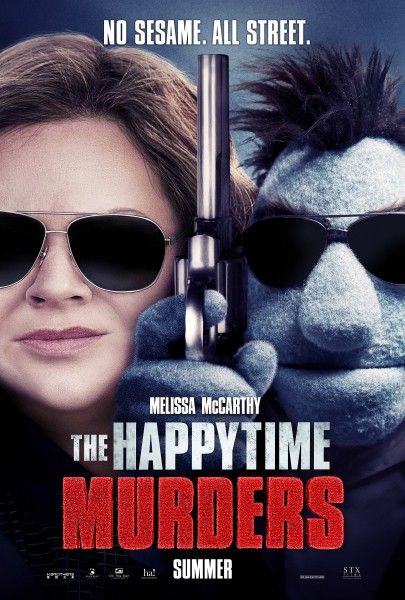The adult comedy The Happytime Murders is set in the underbelly of Los Angeles, where puppets and humans co-exist. From director Brian Henson, the film follows two clashing detectives – a human named Connie Edwards (Melissa McCarthy) and a puppet named Phil Philips (played by puppeteer Bill Barretta) – who are forced to work together to solve the mystery of who is brutally murdering the former cast of The Happytime Gang puppet show.
On October 12, 2017, Collider (along with a handful of other online outlets) was invited to the Santa Clarita, Calif. set, where we got to talk with Melissa McCarthy. During the interview, she spoke about sharing emotional scenes with a puppet, the social undercurrent of the story, what she added to the script, that this is definitely a grown-up, R-rated movie, just how technical it is to work with the puppets, improvising with the puppeteers, why Bill Barretta is a dreamboat, the relationship between Edwards and Phil, what it’s like to work with Brian Henson and to watch him work with the puppeteers.
Question: How surreal of an acting challenge is it to work with the puppets?
MELISSA McCARTHY: What’s crazy is that I thought it was gonna be this whole tricky thing. I thought, “Okay, I guess it will be kinda like with a tennis ball, just ‘cause there’s no eye contact and they’re not looking at you.” What happened, about 15 minutes in, was that I bumped into Phil and I was like, “Oh, I’m sorry, Phil.” And then, I was like, “Oh, okay, I’m nuts!” We’ve had emotional scenes. It’s also ‘cause there’s a crazy thing happening with what a good and incredibly grounded actor Bill Barretta is. They’re not putting wackiness on top of a puppet. It’s a really good, solid character. Within seconds, it goes away in your head and you’re having these lovely scenes, or you’re having fights. I’m weirdly constantly apologizing to Phil. Bill is laying on the ground and I don’t say a word to him, but I’m like, “Phil, I’m sorry.” It’s a whole different thing than anything I could have expected. They’re just so good that they inhabit these puppets and they become incredibly real, immediately.
Is that what drew you to this, or was it the social undercurrent of it?
McCARTHY: It was the social undercurrent, for sure. I thought it was really, really smart. I thought it was saying something without preaching about it, which is always the best way to get your point across. And then, I just thought, “I’ve never seen that.” I’ve never seen this kind of world. And to get to do anything with the Hensons and the dynasty that comes with that. If you’re gonna see how it works, my god, this is the group to do it with. It’s amazing! The machine of how it’s done and who comes in, sometimes there’s four people in one puppet, but the puppet is the most natural thing. There are four humans behind it, but that immediately goes away. It’s getting to work with the very best of the best that do it, and it’s been pretty dreamy. It’s certainly surreal. The Clodhoppers come out and I have so many contraband pictures. I’m constantly like, “Oh, my god, that’s crazy!” I’d never seen one of those in action before. It’s really crazy! It’s just pure imagination.
Your husband, Ben Falcone, said that you did a pass on the script. Was that to add your sense of humor to it?
McCARTHY: It was just to flush out what I wanted to do with Edwards, once I really started to think about what the damage is, how she’s broken and how she’s different. The script was so good that my pass was really just clarifying what I wanted to say. Ben always makes fun of me. He’s like, “You spend eight million years killing yourself over each line, and you’re gonna say something different on set. I don’t know why you bother.” By page 2, when I read this – and I’m not exaggerating – Ben was outside and I walked out and was like, “I think I’m in.” He was like, “You’ve been gone 13 seconds. What do you mean?” I was like, “I know, but there’s a big street scene of gritty L.A. and they’re playing ‘I’m Your Puppet.’” He was like, “Why don’t you go read it?” And then, I came back out on page 4 and was like, “I’m just saying, I really think I’m already in.” I never say that. I wait until the very end and I think about it, but I had the strangest reaction to it. We all grew up with puppets, and when they’re inhabited in such a realistic way, there’s the little voice in the back of your head that goes, “I knew it! I knew they were real!” It’s everything you thought of, as a kid. They just talked to me.
Do they retain their magic, even after doing this?
McCARTHY: What’s really fun is if Bill or one of the puppeteers gets a cramp, but they still have the puppet on, the puppet is suddenly having some kind of a fit. Also, when they talk to camera, it gets me, every time. Bill makes Phil glide out of a scene, but when everything works, it’s crazy. There’s a scene when a puppet is holding me hostage, but I buy it, 100%.
Just how adult is this film?
McCARTHY: It’s definitely a grown-up movie. My kids are like, “We can’t wait to see this!” And I’m like, “I can’t wait to show you, when you’re 40! It will be so wonderful, when you’re 110 and you can see this!” I think it’s part of the fun of it. Somebody was saying that there’s always that thing, when you watch something from The Muppets, one of the movies, or Sesame Street, that when the lights go off, somebody says cut, and they walk out the back door, you wonder if they go into the real world and have a life? This is really seeing behind the curtain. When the lights are off and they’re not having to perform for people, you see the real grind of their lives, and there’s something really cool about it. There’s a weird, edgy coolness, and it’s really funny. It manages to take all those things and shove them together, and weirdly the puppet thing dissolves, but it’s right there. That’s a terrible description of what it is. You don’t not see that they’re puppets, but you immediately think that they’re living, breathing and real. It’s crazy!
What’s it like to have to act around them?
McCARTHY: It’s such a technical thing. There are all these squares on the floor and it’s why all of the sets are built up. The puppeteers stand on the floor and their optimum way to operate is if they’re standing with straight arms, so all of these squares come out. As you’re walking, you have a two-foot margin to stay on your path and there are all these people in crazy green suits that look like a cult. The technical aspect of it is so crazy. All the puppeteers doing this have been with Brian and the Hensons for so long. Even though there’s no floor and I don’t want to fall down, they’re such good actors and they’re so good at what they do that that all goes away. It’s pretty remarkable, I have to say.
How much do you improvise with the puppets?
McCARTHY: A lot. They’re crazy! They’re crazy funny! All of them improvise. You can throw anything at them. Every time Drew [Massey], who plays several things in this, did a take, it was completely different, which both delighted and irritated me. I was like, “Is this written down?! I really work on this, and I think you might just be saying stuff, off the top of your head.” And each one was super specific, really funny and completely different. I was like, “I just wanna see where it’s written. We’re on your eighth take, and it keeps getting better and funnier. Now, I’m just jealous.” He was like, “I’m just saying stuff. Is that okay?” You can throw anything at them. That’s what they do. You can go anywhere with them, and they’ll be two steps ahead of them, for sure.
What’s it like to work with Bill Barretta?
McCARTHY: Bill Barretta is a dreamboat. He’s so good. This is his grandfather – Phil. It’s such a personal, dreamy character, at the heart of it. His face can barely move and his eyes can barely move, but when Phil is upset, everybody feels it. That’s Bill Barretta being this weird wizard at what he does. There’s really no reason that you get all this emotion and humor. You know when he’s hiding something, you know when he’s stalling, and you know when he’s angry, but nothing changes. I’m like, “How do you do it?!” It’s a great magic trick. He’s really smart. We talk about the script, all the time, and we’re always making adjustments. He has such a good feel for it. If something’s not right, Phil and I sit with it for a few minutes and we both are really in sync, which is a delight. You want that with your co-stars, but he’s just something else. I was like, “Can you do something else, without a puppet?” I just want to put him in everything, puppet or no puppet.
What can you tell us about your character’s relationship with Phil?
McCARTHY: Phil and Edwards, my character, came up together. I always thought they were probably in the Academy together and they were partners, and Phil was the first puppet police officer. They were really, really best friends. They had that kind of partnership where you become each other’s confidante and best friend. That’s the person you check in with and who’s your touchstone. And then, when the incident occurred, we were both so damaged by it. It’s so weird to talk about, but there are heartbreaking scenes from Phil. It’s a challenging relationship now ‘cause we’re both damaged goods, which is what I thought was so interesting. One event can shatter a relationship and shatter lives. I have a terrible addiction to sugar, which is like heroin for puppets. It’s ruining my life and I blame him for it, but he saved my life. It’s very dark and very complicated, and at the same time, we have all that stuff built in where you know these people have been together for so long. Even when we fight, you can only fight that way with people that you know and love. It’s brotherly-sisterly love, and they’re best friends. They’re really interesting characters, and there are dark areas and goofy areas. It’s the perfect thing I love, where you touch on a lot of different things.
Is it true that maple syrup gets a bad rap in this movie?
McCARTHY: Yes and no. It really gets highlighted. I open my refrigerator and it’s lined with maple syrup. That’s what I have in my flask, at all times. It’s a love letter and also a cautionary tale, mainly for Canadians.
What else can you tell us about Edwards, beyond her sugar addiction?
McCARTHY: She was a really good cop. It was her life. Instead of a relationship and instead of a family, it was the job and she loved it. It’s what she geared her whole life for, but she just can’t keep it together. She’s still a good cop and she’s doing a good job, but she’s barely keeping it together. She goes on binges. There are cranky moments. She doesn’t suffer rookies very well. She’s pretty hard on a couple people, but they’re being dumb. She’s hard boiled, for sure. She’s been on the job long enough and she’s had a couple of really bad things happen. When you add a really bad sugar and maple syrup addiction, you have this character who is in constant inner turmoil. She still cares about her job and that people being murdered, but she’s failing the victims and herself. She and Phil know each other really well, so it’s a constant barrage of conflict, which is always the best humor. If it’s too easy, it’s not going to be that funny. This is not too easy, for sure.
Did you do any preparation with the puppets?
McCARTHY: I did nothing with the puppets. I can do sock puppets. My kids like sock puppets. I prepared for like everything else I do. I just really work on my character, and when I meet the other actor, you hope that it all clicks and you’re in the same world, and it really did. Phil and I really see things similarly. He’s such a great guy that, if something feels off, he knows that character so well. You have to say what feels right. But, I did prepare. I didn’t just show up.
Did you have to come in and do a chemistry read with Phil, before working with him?
McCARTHY: I did come in and meet him. I was so nervous. He was on his stand. I was like, “Is this gonna be weird? I don’t know how this is gonna work.” And then, I met Bill, who just immediately put him on and was only talking to me as Phil. I kept trying to look at Bill, and Bill kept putting Phil in the front of his face. The next thing I knew, I was having a full conversation with Phil. I was like, “This is gonna go great!” I felt it within 20 seconds. I went from having this feeling of, “I don’t know how to do this. Am I really supposed to talk to the puppet, or do I crane around and try to talk to Bill?” to having a real conversation with a felt puppet.
How are you approaching the societal aspect of this story?
McCARTHY: There’s definitely nothing child-like about it. That’s the one thing we really worked at. There’s no aspect of, “Is this a kid’s movie?” This is not a raunchy kid’s movie. It’s really just a straight-up gritty comedy that happens to have puppets. I only say it like that because somehow, at least in what we’ve seen and what we’re working on everyday, it really does make it what I dreamed that it would be, in that it’s just a good, gritty crime movie that happens to be really funny, and there’s this side note that there’s puppets in it.
How are the puppets looked at and thought of by society?
McCARTHY: They’re certainly second class citizens. I think that’s the comment. When you can show the worst of us, in a way that’s palatable for people and maybe they don’t know they’re being shown – because not everybody likes to have the mirror held up to them – and can hold up the mirror in a way that’s still entertaining, it works on a subconscious level. I always think that’s a good way to do it. If you can make your point to make them laugh, sometimes people can take it a little better. We can all use a mirror shoved up in our face. We don’t really love it, but we could all use it.
Were there puppet mishaps? What do puppet bloopers look like?
McCARTHY: They’re pretty great! They get tongue-tied because they stay in character. It’s going to be the best blooper reel, ever, because the puppeteers don’t present themselves by saying, “Oh, I messed up!” They’re like, “Oh, my god, I don’t know my line!” They totally say that. The puppet is always active. WE did a bunch of stuff for Kevin Clash, who does a bunch of puppets. He oversees everything. For heaven’s sake, we have the guy who created Elmo and he’s saying terrible things. We’ve destroyed that for people. But, it’s really funny how they always stay in it. You have this great footage of the puppets doing bloopers because they never come out of it. It’s pretty interesting.
What’s it been like to work with Brian Henson on this?
McCARTHY: Whether you just come for a couple of hours to watch, or you’re very familiar with sets, you can see how different this is and how technically adept Brian is. He’s doing something that no one else can do. There is no way to do this without Brian Henson. It’s really crazy, but he’s grown up with it. It’s in his DNA. There are things where I’m like, “That looked fine. That looked amazing!” And he’s like, “The gate was off.” He’ll see something in it and know that it won’t look right. He’ll come in and change something on the puppet, and then we’ll do another take and I’ll be like, “Oh, god, it’s better!” It’s so frustrating because you don’t see it. You don’t have the eye, but he’s seeing it in real time. And they’ve all worked together. They’re so close and it’s such a nice, big family. That’s what you want. They’re all friends and they’ve worked together for so long that there’s such a nice secondhand to all of them. They all come in and help. Puppeteers are very collaborative. They’re all there to help and nothing is out of the realm. If somebody needs help, they just all pitch in and do it.
With Brian Henson directing and telling you where to stand and what to say, do you ever feel like you’re becoming a puppet?
McCARTHY: I’ve been a puppet for years! I have two kids. I haven’t made my own decisions, in a long time. Also, Brian’s in it. He plays a crab. He was in a garbage can, directing. I just kept taking pictures of him. He was literally sitting in a garbage can with a crab, but he was also like, “Can you move the camera over?” It was great! That was pretty fun. I’ve never been directed by someone in a garbage can. That’s a real feather in my cap.
Does he direct humans differently than puppets?
McCARTHY: I would say no. He still addresses the puppet, as the character. There are two sides, where he’ll speak to the puppet, but then there’s so much technical stuff with the puppeteers. That takes a lot more time. It’s so incredibly technical that they work through all of those beats first, as the puppeteers. But then, once they’ve got it, he really concentrates on the character and what they’re doing. It’s a pretty cool process to watch.
The Happytime Murders opens in theaters on August 24th.

